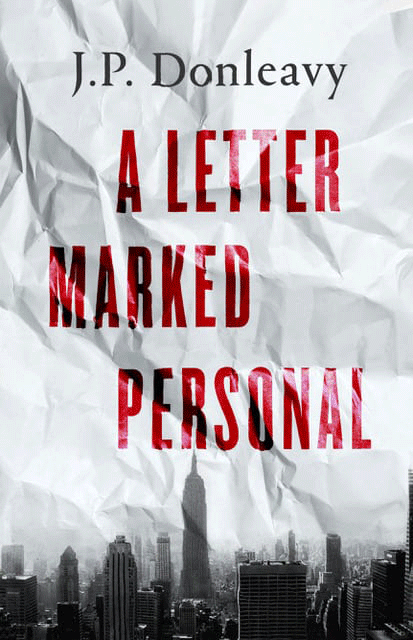
REVIEW: Following on from 2018’s enjoyable and revealing publication of J.P. Donleavy’s The Ginger Man Letters, we now have his last novel, A Letter Marked Personal. Donleavy who died on 11th September, 2017, has written his final farewell to the city of his birth, New York. Based on a true story told to Donleavy by a friend, in which a letter marked “personal and confidential” is opened by the wife of the intended recipient, leading to disastrous consequences. The novel’s protagonist, Norman Langriesh Johnson, is the founder and chairman of Nathan Johnson Lingerie, a company he built up from his days as a door-to-door salesman. Rich and seemingly happy, living a comfortable life on the 37th floor of his exclusive apartment block with his snobbish and social-climbing wife, all is not well. Constantly worrying about bankruptcy, being ripped-off by staff and suppliers, and the temptations of viewing half-naked women modelling his underwear, he escapes to his office near the Flatiron Building to spend “endless hours daydreaming and listening to music”.
Giving in to temptation, Nathan falls in love and becomes obsessed with the beautiful Iowa, one of his models. However, this infatuation is not one-sided, and Iowa stalks Nathan to his secret office and on a subsequent visit requests a promotion and a raise to which he readily agrees. Meanwhile, he is in the process of buying a country mansion as a birthday present for his wife, Muriel.
The narrative continues in Donleavy’s inimitable style in reaching its denouement: frequent changes in narrator and narrative perspective; characterisation expressed through stream of consciousness; and the protagonist’s realisation of the absurdity of his position in the world. Many parallels can also be drawn between A Letter Marked Personal andDonleavy’s first novel and masterwork, The Ginger Man. The recurring themes of obsession, sex, love and death pervade the two novels. Both also have an underlying sense of melancholy and end with intimations of death. Of course the dark humour is still evident and there is even a fearful reminder of the unfortunate incident of the contents of the toilet falling through the ceiling in chapter six of The Ginger Man: “Was his toilet leaking again?”
Place has always been an important aspect in Donleavy’s novels and A Letter Marked Personal is no exception. The author’s personality haunts the text with autobiographical references: Brooklyn where he was born and the Bronx where he was raised; Woodlawn Cemetery where he used to visit Herman Melville’s grave; and Westchester, where he spent six months at the public high school.
There has been some criticism of the portrayal of characters in this novel, especially the depiction of women. Donleavy has never shied away from exploring the flawed traits in his protagonists (pace Sebastian Dangerfield) and whilst we may not agree with their actions or morals, one has to only look at the current debate into interactional behaviour between the sexes to see elements of truth in his characterisations.
In A Letter Marked Personal J.P. Donleavy has given us his valedictory novel and left us with reminders of his lyrical style, colourful characterisation, black humour and that he is saying something fundamental about the human condition. Although his last novel, I hope there is more yet to come from the Donleavy archive.
Lilliput Press are to be complimented in continuing to publish Donleavy when other publishers seem to have lost faith, and their association with Bill Dunn, Donleavy’s friend and archivist, has richly enhanced our reading experience of recent Donleavy publications.
Colin Overall

Colin Overall has a BA in Irish Studies and English from the University of North London, and an MA in Beckett Studies from the University of Reading. He has published work on J.P. Donleavy and is an enthusiastic collector of his books.
A Letter Marked Personal, J. P. Donleavy, The Lilliput Press, 9781843516972, €15.











